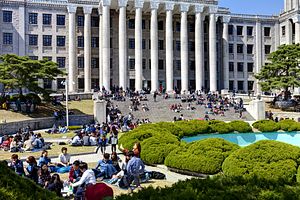There is a fine but significant line between the history of a nation and nationalist histories. The former is more likely to be objective, the latter anything but. Narratives dictated by states fall on the side of nationalist histories. Indeed, Benedict Anderson, commenting on the “truth” of national histories, remarked: “Histories written by the state are almost always false.” Ernest Renan wrote, “Getting its history wrong is part of being a nation.” Such is the nature of state- and nation-building efforts: controlling narratives and information for the sake of maintaining legitimacy. A recent textbook battle in South Korea shows this process in action.
In 2013 the Ministry of Education instructed publishers to revise several Korean history textbooks. Hundreds of revisions were requested. The move ignited a fierce debate. Progressives saw the review as a deliberate attempt to whitewash autocratic rule and legitimize a conservative view of history and the state. Leftist fears were not unwarranted. Some of the revisions (e.g., removing any mention of the Gochang Massacre and excluding photos of the first North-South summit) can be reasonably interpreted as proof that the Ministry of Education has a “rightist bias.”
Textbook writers, with support from civil society organizations, the Hankyoreh, and allies in the National Assembly, set forth to challenge the order. The challenge made its way to a Seoul Administrative Court. On Thursday, the court issued its ruling: the Ministry of Education’s actions were both legal and warranted.
While the court explicitly stated that the ministry has certain boundaries, it ruled that it is within the ministry’s legal remit to order revisions to the content of school textbooks and syllabi. The court added that no procedural rules were violated in the process of deciding the latest rounds of revisions.
For its ruling, the court considered the specific revisions ordered by the Ministry of Education.
For instance, the court found that facts pertaining to the 1946 Land Reform Law and the role played by the North Korean Provisional People’s Committee (led by Kim Il-sung) were distorted or wrong, thus requiring “correction.” It also noted, with regard to North Korean ideologies (Juche and Korean Ethno-centric Absolutism), that “as they are presented, students are not able to accurately understand the meaning of North Korea’s political positions. Providing supplementary analysis will help students gain a deep understanding.”
Other issues included Park Chung-hee’s economic policies and the 1997 Asian Financial Crisis. On these issues, the court wrote: “Forcefully linking historical events that do not have a clear causal relationship and lack economic evidence will make it hard to form a national or academic consensus on these issues.”
More recent events were also considered. The Ministry of Education’s modification instructions regarding the Cheonan and Yeonpyeong-do incidents say to specify the events themselves rather than just the actor (North Korea). The court ruled that “rather than clearly stating the actor, this will allow accurate information to be delivered.”
For some, the court’s ruling will only confirm their suspicion that the current government (and the ministries serving its cause) represents little more than a reincarnation of autocratic rule in South Korea. This view was forcibly articulated after the Constitutional Court ruled to disband the United Progressive Party (UPP) for being a threat to the democratic order.
However, what those cut from the cloth of the 1980s student movement will likely never admit is that a liberal government would act similarly. (In fact, this precisely what the Chosun Ilbo claims, but for all the wrong reasons.) As stated, the narrative arc of history, as it is dictated by the state, is deliberately bent to justify its view of the nation and the state. While those in power may change, the manipulation of history (and the revision of textbooks) will continue.

































